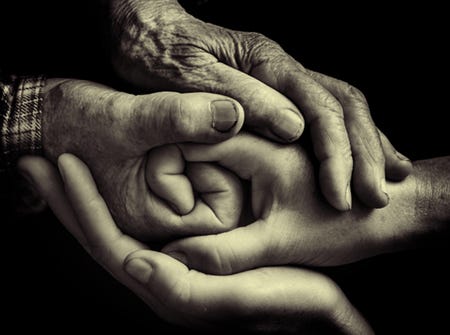In a Hard-Core World, Can Empathy Be Learned?
And more importantly: can we afford to live without it?
Some people are not sociopaths or psychopaths, but they still lack empathy. Why?
Can someone help them, or is it useless? Some don't practise it because of various issues, such as being introverted, but that doesn't mean they lack it.
What is empathy?
Genuine empathy is linked to compassion and, as such, is also linked to emotional intelligence.
To develop empathy, one must connect with others. That's essential. We must experience our differences and learn from them. Learning from others is fundamental, as we sometimes don't understand why we want one thing and they want the opposite.
If we love to go to a party, and they don't, we find it hard to comprehend why. If that is the case, we must ask rather than judge. A simple “why” could solve the problem, and we could learn much from a simple answer. There's no need to complicate the matter by starting an argument and placing blame. What would that accomplish?
If their choice frustrates us, engaging in a rapport would be best, offering support instead.
At that moment, we need to listen. Someone else will be talking. Don't interrupt, whatever you do.
Listening is a significant factor in empathy. Without it, we cannot proceed or gain any ground on our quest for it. You have asked a question; now, you must pay attention to the answer.
Inclusion is very important, and it belongs right next to attention. Understand what the person is communicating and offer as much support as possible.
The benefits of such actions are enormous. They will help you grow, and those simple steps will mean everything to your shared future.
To develop empathy, one must want to learn about other cultures, traditions, and ways of life from places other than one's own.
Learn about specific topics, problems they could face, or problems their countries might face.
Travel to other places you aren't familiar with and engage the people there with an open mind. Again, do not make judgements. That's the antithesis of empathy. Let your ego be at the door.
Your mind will demand that you do. Do not listen. Choose a positive attitude first, and offer kindness as much as possible. Empathy cannot function without kindness, and vice versa.
Recognise other people's challenges and think, What if they were your own? Look retrospectively and find yourself in that situation, or worse.
Once you manage to accomplish this, you are halfway there. If your emotional sense kicks in, offer help. First, identify what kind of assistance is needed and then see if you can provide it.
Maintain eye contact and avoid looking at your phone while listening to someone in need. Don't make it about you. Empathy is not that. Neither is compassion. Your ego is most likely chomping at the bits to judge, interrupt, and compare your life to theirs. It's a trap. Don't fall for it.
Always offer help when you can. Smile at the cashier who's overwhelmed and make a joke to lighten her burden. Place yourself in their situation, but stay away from offering advice. You don't know what the person is dealing with. Your empathy will be recognised, and you are already reaping the benefits—and so is the cashier.
Always help animals in need by whatever means necessary and available. Provide water if it's a brutally hot day, and even if it is not, they will always drink it.
Make a serious effort to teach the children. Due to their underdeveloped frontal lobes, they have no concept of empathy, but if it's in their genes, they can easily feel compassion. But that's an essay for another day.
There you go. The basics of learning empathy. It is one of the greatest virtues of humankind and something we need to have for our very own existence.
~o~
If what I wrote gave you food for thought, I hope you’ll consider upgrading to a paid subscription. I’d greatly appreciate it.
Thanks for reading!









I think, when I was growing up, we were taught to imagine ourselves in someone else's shoes. These days, schools tend to spend all the class time preparing kids to score well on tests, but they don't seem to emphasize any version of caring about someone else's plight. So many kids are enabled, thinking they can do no wrong, they are better than someone else, and that if they did do something they know is wrong that their parents will pull a Karen and fix it with no consequences. This is compounded by kids in less than ideal situations hiding their need for help and/or acting out because the lack of empathy from their peers is increasing their levels of jaded thinking. Kids learn what they are taught by repetition. In otherwords, if the the parent is constantly telling the child he/she is smarter than everyone else and better than everyone else, the child will learn that behavior, just as a child who is repeatedly told he is dumb, eventually accepts that he is dumb, and stops trying. I call this brainwashing by repetition. It works on children and adults. Particularly if what they keep hearing is what they want to hear. I went to catholic school. The reason they required us to wear uniforms was to create a condition where all the kids were dressed the same to even the playing field. It wasn't 100% effective, but it went a long way toward keeping things somewhat level. As far as teaching empathy, educators can only do so much, but it might help to have classes is socialization, where the students are required to do projects that help others. If they don't understand the level of needs, they will never do anything about helping fill those needs. In this case, ignorance really is bliss because it allows the enabled to ignore those who could benefit from a little help, and feel no guilt or regret. It reminds me of a favorite song, "On The Turning Away" by Pink Floyd. I recommend everyone add it to their playlist! Then listen to it everyday!
I read in a recent book called Stolen Focus that people who read lots of fiction (as opposed to non-fiction) actually had higher levels of empathy. It was fascinating to me. Lovely essay. Thank you.